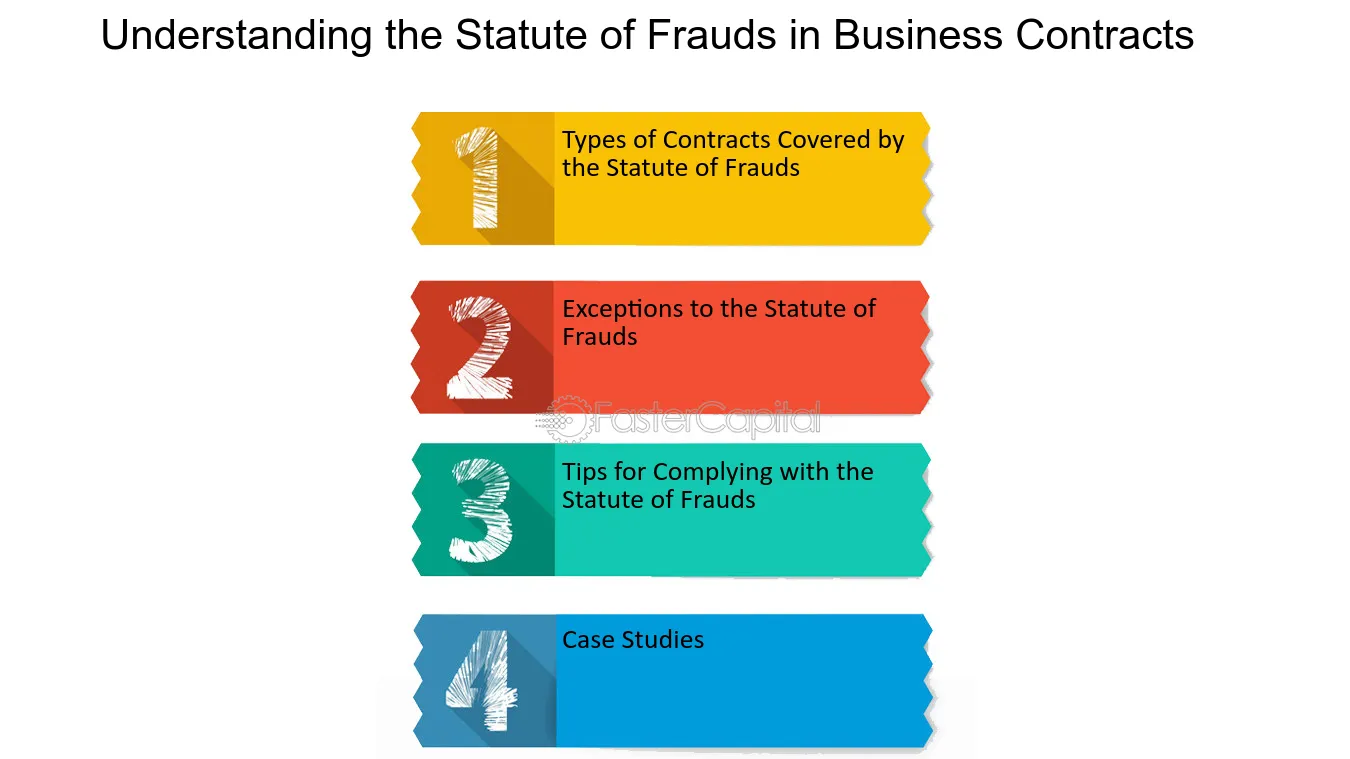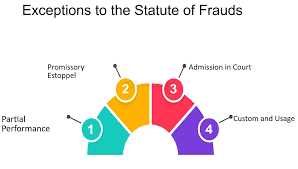Statute of Frauds: Purpose, Covered Contracts, and Exceptions
Covered contracts under the Statute of Frauds include contracts for the sale of real estate, contracts that cannot be performed within one year, contracts for the sale of goods over a certain value, and contracts in consideration of marriage. These contracts must be in writing and signed by the parties involved in order to be legally binding.
However, there are exceptions to the Statute of Frauds. One exception is the part performance doctrine, which allows a contract to be enforced even if it is not in writing if one party has partially performed their obligations under the contract. Another exception is the admission of the existence of an oral contract in court, which can make the contract enforceable.
Enforcement of the Statute of Frauds can vary depending on the jurisdiction. In some cases, a party may be able to seek specific performance of the contract or damages for breach of contract. In other cases, the contract may be deemed unenforceable and the parties may be left without legal recourse.
The implications of the Statute of Frauds for contracts are significant. It highlights the importance of having written agreements for certain types of contracts to avoid disputes and ensure enforceability. Parties should be aware of the requirements of the statute and take steps to comply with them to protect their rights and interests.
Purpose of the Statute of Frauds
The Statute of Frauds is a legal doctrine that requires certain types of contracts to be in writing in order to be enforceable. The purpose of the statute is to prevent fraud and promote clarity and certainty in contractual agreements.
Historical Background
The Statute of Frauds originated in English common law and was enacted in 1677. It was introduced to address the widespread problem of fraudulent transactions and unreliable oral agreements. The statute was later adopted by many other countries, including the United States.
Initially, the statute covered only specific types of contracts, such as contracts for the sale of land, contracts that could not be performed within one year, and contracts for the sale of goods above a certain value. Over time, the scope of the statute expanded to include various other types of contracts.
Promoting Clarity and Certainty
One of the main purposes of the Statute of Frauds is to promote clarity and certainty in contractual agreements. By requiring written evidence, the statute ensures that the terms and conditions of a contract are clearly documented and agreed upon by all parties involved.
Preventing Fraudulent Claims
Another important purpose of the Statute of Frauds is to prevent fraudulent claims. By requiring written evidence, the statute acts as a deterrent against parties making false or exaggerated claims about the existence or terms of a contract.
Without the statute, parties could easily manipulate or fabricate oral agreements to their advantage. The requirement of a written contract ensures that parties cannot easily deceive or defraud one another. It provides a higher level of proof and accountability, making it more difficult for parties to engage in fraudulent behavior.
Overall, the Statute of Frauds plays a crucial role in promoting fairness, clarity, and honesty in contractual agreements. It protects parties from fraud, ensures that their intentions are clearly documented, and provides a reliable framework for resolving any disputes that may arise.
Covered Contracts under the Statute of Frauds
1. Contracts for the sale of real estate: Any agreement for the sale of land or real property must be in writing to be enforceable. This includes contracts for the purchase of a house, a piece of land, or a commercial property.
2. Contracts that cannot be performed within one year: If a contract cannot be completed within one year from the date it is made, it must be in writing. This includes agreements for long-term services or contracts that extend beyond a year.
3. Contracts for the sale of goods over a certain value: The Uniform Commercial Code (UCC) sets forth the requirement that contracts for the sale of goods over a certain value must be in writing. The threshold amount varies by jurisdiction, but it is generally around $500 or more.
4. Contracts for the transfer of copyrights or intellectual property: Agreements involving the transfer of copyrights, patents, or other intellectual property rights must be in writing to be enforceable. This ensures that the parties have a clear record of their rights and obligations.
5. Contracts for the guarantee or suretyship: If someone agrees to be responsible for another person’s debt or obligation, the agreement must be in writing. This includes contracts for co-signing a loan or acting as a guarantor.
Exceptions to the Statute of Frauds
The Statute of Frauds is a legal doctrine that requires certain contracts to be in writing in order to be enforceable. However, there are several exceptions to this rule where oral agreements can still be legally binding. These exceptions vary depending on the jurisdiction, but some common exceptions include:
1. Partial Performance
One exception to the Statute of Frauds is when there has been partial performance of the contract. This means that one party has already started to perform their obligations under the contract, even if the contract itself is not in writing. In such cases, a court may enforce the contract based on the partial performance.
2. Promissory Estoppel
Promissory estoppel is another exception to the Statute of Frauds. It applies when one party has relied on the oral promise of another party to their detriment. If enforcing the contract is necessary to prevent injustice, a court may enforce the oral agreement under the principle of promissory estoppel.
For example, if Party A promises to sell their car to Party B, and Party B relies on this promise by selling their current car and making arrangements to purchase the car from Party A, a court may enforce the oral agreement to prevent Party B from suffering a loss.
3. Custom-Made Goods
In some jurisdictions, contracts for custom-made goods are exempt from the Statute of Frauds. Custom-made goods are goods that are specially made or tailored to the buyer’s specifications. Since these goods are unique and cannot easily be resold to another buyer, a court may enforce an oral agreement for custom-made goods.
4. Admission in Court

If a party admits in court that an oral contract exists, the Statute of Frauds may no longer apply. This admission can be used as evidence to enforce the oral agreement, even if it would otherwise be unenforceable under the Statute of Frauds.
It is important to note that these exceptions may not apply in all jurisdictions, and the specific requirements for each exception may vary. It is always advisable to consult with a legal professional to understand the laws and regulations in your jurisdiction.
Enforcement of the Statute of Frauds
The enforcement of the Statute of Frauds is crucial in ensuring the validity and enforceability of certain types of contracts. The statute requires that certain contracts be in writing and signed by the parties involved in order to be enforceable in a court of law.
One of the main purposes of the Statute of Frauds is to prevent fraudulent claims and disputes arising from oral agreements. By requiring written evidence of certain contracts, the statute aims to provide a clear record of the terms and conditions agreed upon by the parties involved.
Types of Contracts Covered
The Statute of Frauds covers several types of contracts, including:
| Contract Type | Requirements |
|---|---|
| Contracts for the sale of real estate | Must be in writing and signed by the party against whom enforcement is sought |
| Contracts that cannot be performed within one year | Must be in writing and signed by the party against whom enforcement is sought |
| Contracts for the sale of goods over a certain value | May require a written agreement, depending on the jurisdiction |
| Contracts for the transfer of interests in land | Must be in writing and signed by the party against whom enforcement is sought |
| Contracts for the sale of securities | May require a written agreement, depending on the jurisdiction |
Exceptions to the Statute of Frauds
While the Statute of Frauds generally requires written contracts for enforceability, there are certain exceptions to this rule. These exceptions include:
- Part performance: If one party has partially performed their obligations under an oral contract, a court may enforce the contract to prevent injustice.
- Promissory estoppel: If one party has relied on the oral contract to their detriment, a court may enforce the contract to prevent injustice.
- Admissions in court: If a party admits to the existence of an oral contract in court, the contract may be enforceable.
- Contracts for goods: In some jurisdictions, oral contracts for the sale of goods below a certain value may be enforceable.
It is important to note that the specific requirements and exceptions to the Statute of Frauds may vary depending on the jurisdiction. It is advisable to consult with a legal professional to understand the specific laws and regulations applicable to a particular contract.
Implications of the Statute of Frauds for Contracts

The Statute of Frauds has significant implications for contracts, as it requires certain types of contracts to be in writing in order to be enforceable. This serves to protect parties from fraudulent or unenforceable agreements and promotes clarity and certainty in contractual relationships.
1. Written Requirement

One of the main implications of the Statute of Frauds is the requirement for certain contracts to be in writing. This means that parties must document the terms and conditions of the agreement in a written form, signed by the parties involved. Oral agreements, even if they are legally binding, may not be enforceable if they fall within the scope of the Statute of Frauds.
2. Specific Contracts
The Statute of Frauds applies to specific types of contracts, including:
- Contracts for the sale of land or real estate
- Contracts that cannot be performed within one year
- Contracts for the sale of goods over a certain value (varies by jurisdiction)
- Contracts made in consideration of marriage
- Contracts for the transfer of copyrights or patents
These contracts must meet the written requirement in order to be enforceable.
3. Exceptions
While the Statute of Frauds generally requires contracts to be in writing, there are certain exceptions to this rule. These exceptions include:
- Part Performance: If one party has partially performed their obligations under an oral contract, a court may enforce the contract to prevent unjust enrichment.
- Promissory Estoppel: If one party has relied on the oral contract to their detriment, a court may enforce the contract based on the principle of promissory estoppel.
- Admission in Court: If a party admits in court that an oral contract exists, it may be enforceable despite the lack of a written agreement.
4. Enforceability

If a contract falls within the scope of the Statute of Frauds and does not meet the written requirement or fall under an exception, it will generally be unenforceable. This means that a party cannot sue for breach of the contract or seek specific performance. However, the parties may still have other legal remedies available, such as restitution or damages.
It is important for parties to be aware of the implications of the Statute of Frauds when entering into contracts. They should ensure that any covered contracts are properly documented in writing to avoid potential disputes and unenforceability.

Emily Bibb simplifies finance through bestselling books and articles, bridging complex concepts for everyday understanding. Engaging audiences via social media, she shares insights for financial success. Active in seminars and philanthropy, Bibb aims to create a more financially informed society, driven by her passion for empowering others.
